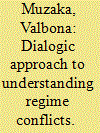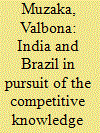|
|
|
Sort Order |
|
|
|
Items / Page
|
|
|
|
|
|
|
| Srl | Item |
| 1 |
ID:
090719


|
|
|
|
|
| Publication |
2009.
|
| Summary/Abstract |
This paper seeks to put the spotlight on the ongoing contestations in the area of trade negotiations, global intellectual property rights (iprs) and access to medicines. It aims to shows that these contests are real and have important consequences for how global public health needs are met and on the form and shape of the emerging global iprs regime. More specifically, it shows how the coalition of some developing countries and international health ngos has scored some victories and lost ground elsewhere in the iprs-access to medicines battle which is taking place both at the multilateral and bilateral level. It concludes that the coalition of developing countries needs to be both on the offensive and on the defensive, so as to defend past victories, cut losses and win new victories simultaneously.
|
|
|
|
|
|
|
|
|
|
|
|
|
|
|
|
| 2 |
ID:
151485


|
|
|
|
|
| Summary/Abstract |
Despite the fact that early work on international regimes conceptualised them as dialogic in nature, this fundamental regime property has remained relatively underdeveloped. Drawing on the work of Mikhail Bakhtin and his circle, this article proposes a dialogic framework for understanding regimes and the political struggles that constitute them. Focusing on the contextual and relational properties of signification processes within a regime, one of the key arguments is that neither their dialogic nature nor the trajectory and outcome of a particular conflict can be understood without giving full attention to language as a power-laden form of action. By focusing on how language and discourse are implicated and put to work in a particular instance of regime contestation, namely the Development Agenda proposed by a group of developing countries’ representatives at the World Intellectual Property Organization in 2004, efforts are made not only to bring to the fore the political and ideological nature of the ‘shared understandings’ without which a regime would not exist, but also the manner in which they are reproduced and reinvigorated, even by acts that set out to challenge them.
|
|
|
|
|
|
|
|
|
|
|
|
|
|
|
|
| 3 |
ID:
139583


|
|
|
|
|
| Summary/Abstract |
This article challenges conventional narratives that suggest that the travails in the Doha Round, the shift to bilateral free trade agreements, and the broader unfolding of the global crisis collectively presage the decline of either the WTO or the broader institution of multilateral trade. We question the extent to which recent trends can indeed be said to constitute a genuine crisis of trade multilateralism by reflecting upon the contradictory and ambiguous nature of the multilateralism of the past, and also upon how contemporary multilateralism has been framed with reference to it. Our main finding is that, in contrast to the many short and medium-term symptoms which tend to appear in the conventional story of multilateral decline, there is actually a far more worrying long-term trend which underpins the varied conflicts that characterise contemporary trade politics: the fundamental lack of a shared social purpose between the developed countries and the more powerful emerging countries on which a stable, equitable, and legitimate edifice of multilateral trade rules can be erected, institutionalised, and enhanced.
|
|
|
|
|
|
|
|
|
|
|
|
|
|
|
|
| 4 |
ID:
164982


|
|
|
|
|
| Summary/Abstract |
The aim of this article is twofold: first, it seeks to address the question of why the competitive knowledge economy orientation that emerged in certain economically advanced states as a response to the crisis of Fordism came to be embraced by the Indian and the Brazilian states from the late 1980s onwards. Second, it aims to elucidate the manner in which the goal of becoming competitive knowledge economies has been articulated and implemented locally, especially from the mid-1990s onwards, by key fragments of the Indian and the Brazilian states. Drawing on insights from the competition state, regulation school, knowledge economy literature and that on India and Brazil, attention is paid to the context- and conjuncture-specific domestic and international factors that have contributed not only to the adoption of the competitive knowledge economy orientation, but also to the necessarily distinctive ways in which it found expression in practice in India and Brazil.
|
|
|
|
|
|
|
|
|
|
|
|
|
|
|
|
| 5 |
ID:
110786


|
|
|
|
|
| Publication |
2011.
|
| Summary/Abstract |
Intellectual property rights (IPRs) ultimately delineate the way in which knowledge is created, owned, controlled and diffused, domestically and now globally. They have always been contested because knowledge is both a form of capital and a public good, but these contests have become more acute since the WTO TRIPs Agreement came into force in 1995. As a result of new frames and linkages propelled by various actors between IPRs and other issue-areas, the current intellectual property regime has become complex and somewhat inconsistent. This article contributes to a better understanding of the concrete mechanisms and processes through which various global regimes come to overlap with each other in the area of IPRs, of the actors that are involved in these processes, as well as of the consequences of such developments for the governance of IPRs and global governance more generally.
|
|
|
|
|
|
|
|
|
|
|
|
|
|
|
|
| 6 |
ID:
116902


|
|
|
|
|
| Publication |
2013.
|
| Summary/Abstract |
We routinely refer to pharmaceutical patents as intellectual property rights. The argument in this article is that pharmaceutical patents represent a 'bargain' between government, business and society. The pharmaceutical patent system constitutes a social institution with social goals that go well beyond solely providing incentives to proprietary pharmaceutical companies to develop innovative drugs. Therefore we need to assess this institution in terms of what is referred to here as its social effectiveness, that is, its ability to accomplish the social goals it was set up to achieve. Such assessment has to take into account the fact that the pharmaceutical patent system has now become global, a development that has made its social ineffectiveness more apparent and worrisome. The severity and gravity of unmet global and local public health needs compels urgent scrutiny of the pharmaceutical patent system, as well as of alternatives to it, such as prizes for pharmaceuticals.
|
|
|
|
|
|
|
|
|
|
|
|
|
|
|
|
|
|
|
|
|